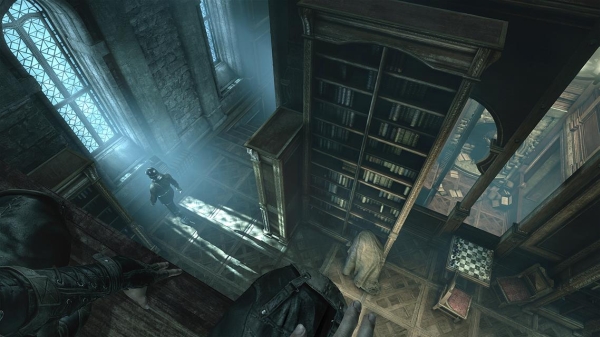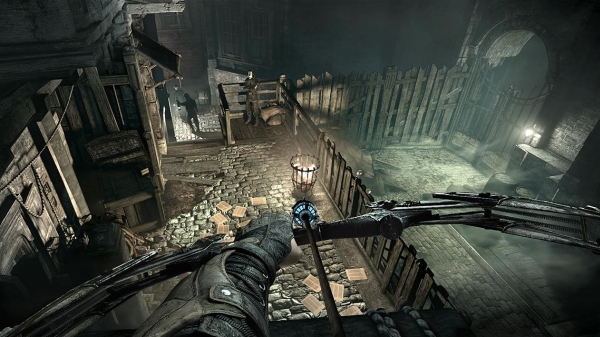
I’ve been a fan of the stealth genre since 1998, when I first played the greatest game ever: Metal Gear Solid. No hyperbole, of course. That’s not to say I don’t like other games in the genre, too: the entire Splinter Cell series is excellent and, more recently, Dishonored was hugely impressive. However, Thief was one I just never played. The loot-em-up is apparently the genesis of some stealth mechanics, such as light meters and sound cues, which were revolutionary achievements in the first person point of view. So, it should have been no surprise that I was incredibly intrigued by this new reimagining of Thief.
Sadly, if opportunity makes a thief, this reboot offers them up sparingly.
Platforms: PC, PS3, PS4 (Version Played), Xbox 360, Xbox One
Publisher: Square Enix
Developer: Edios Montreal
Genre: FPS… First Person Sneaker
Release Date: February 25, 2014
ESRB Rating: Mature
Set in an urban area that is almost eternally wrapped in darkness, Thief is all about the mood. “The City,” a sprawling metropolis with a vague resemblance to nineteenth century London, is Garrett’s playground. The narrow streets are heavy with fog and turmoil as a mysterious plague known as “The Gloom” infects its residents, and the despotic rule of the baron becomes the catalyst for civil unrest. The passages and alleyways flow together like tributaries under multi-tiered structures that look awkwardly built in a case of uncontrolled urban ghettoisation. Walking around The City in this engaging and enraging game is one of the simplest and best pleasures.
As the story begins, you meet Garrett and his ambitious but irresponsible partner Erin. The pair takes on a mission that causes them to stumble upon a ceremony involving the elders of The City using some sci-fi mysticism to create a better world. As I’m sure you could have guessed, things go awry and Erin is lost and Garrett gets put into a coma for a year. When he sneaks back into The City, restless, he intends to use these conditions to his advantage during his thievery. But yet, he gets pulled back into the events that happened during the prologue and begins to learn about the selfish people in charge and what has happened to his corrupted city.
In honesty, I’m making it sound better than it actually is. There are a lot of interesting ideas that could have been explored throughout the rather meandering pace of the gameplay, but, as moments of progression in the story are few and far between, those ideas are rarely touched upon. As the narrative stops and starts throughout your time in it, you have a lingering feeling that there should – and could – have been more. As a result, you get the who and the what, but you never really get to the why. Investing in characters and their arcs is impossible, and subsequently the ending result does not resonate as much as intended.

Despite having a story that will give you little to no motivation after the first hour, the gameplay is a driving factor in wanting to progress. You sneak through the environment, in and out of shadows, across beams, roofs, and onto crates and structures, all while carrying a melee weapon capable of incapacitating guards if you get spotted. It’s all very Dishonored, which is apt, as Dishonored was all very Thief, except it doesn’t feel anywhere near as tight. With one button to control your sprinting and climbing, performing a specific action to complete a move in your elaborate plan can prove to be challenging, leading to multiple reloads, chiefly in some of the end-of-level set pieces.
Admittedly, Garrett’s hands are a huge upside. As strange as that sounds, it’s true. Seeing his hands rummage through drawers and pinching out candles is an excellent visual tool that is oddly satisfying. That, along with the swooping move that allows Garrett to quickly go between shadows or cover, empowers the player and makes Garrett feel like a master thief, rather than just a faceless pawn. Garrett also has access to a focus move, thanks to the accident that placed him in the coma, that allows you to see interesting objects in the environment and, through upgrades, improve some of his skills, including those in stealth and combat. While those upgrades are not exactly useful all the time, having a way to pick out items of note among the game’s dark visual design is essential.
As soon as Garrett gets spotted, everything falls to pieces. When the hunter becomes the hunted, you have two choices: fight or flight. Neither is a good plan in Thief. Despite guards not being able see you under their feet in the shadows, once you get caught, you enemies know every hiding spot in the game, meaning you get to either run and unsuccessfully hide, or fight. The latter is not a great choice, either. Garrett doesn’t have the variety in tools or skills to take on one guard, let alone the five or six that can chase you at once.

Thief is a slow game, and that is in its favor. Each situation the game puts Garrett in has many differing ways through, depending on play style, inventory, and available upgrades. Once you finally manage to achieve your intentions, it’s heartily satisfying, despite having varying degrees of confidence in the success of your plan. However, as you progress through each level, that feeling becomes rote. I quickly slipped into a pattern of entering an area, finding the points of interest, eliminating the guards, then moving on. The hand of the level designer begins to lord over you, which removes any sense of discovery from the player, leading to an unsustainable monotony in the gameplay.
Side missions are just as promising but, rather than offering a unique or differing challenge to those presented in the story, they fail in similar areas. They are a wonderful excuse to explore the infected underworld of “The City”, or they would be if it wasn’t for “The City” itself. Despite the setting being well themed, finding your way to a specific spot it not easy. Thanks to the fact that the game can only load in one small portion of “The City” at any one time, and the on screen pointer is rather vague, you will spend much your time, heading towards the wrong alcove or balcony or just sitting in loading screens that are as frequent as they are lengthy.
It is easy to dump on a game from a great height when it’s bad: similarly, throwing around words like “masterpiece” and “game changer” is straightforward and effortless. It is this grey middle area where Thief exists. The game has flashes of brilliance that just have not been given the care they deserve. It’s frustrating, knowing that Thief could have been better, but even the more intelligent parts of the game serve only to vex.

Review Disclosure: A retail copy of Thief was purchased by Warp Zoned for the purposes of this review.







